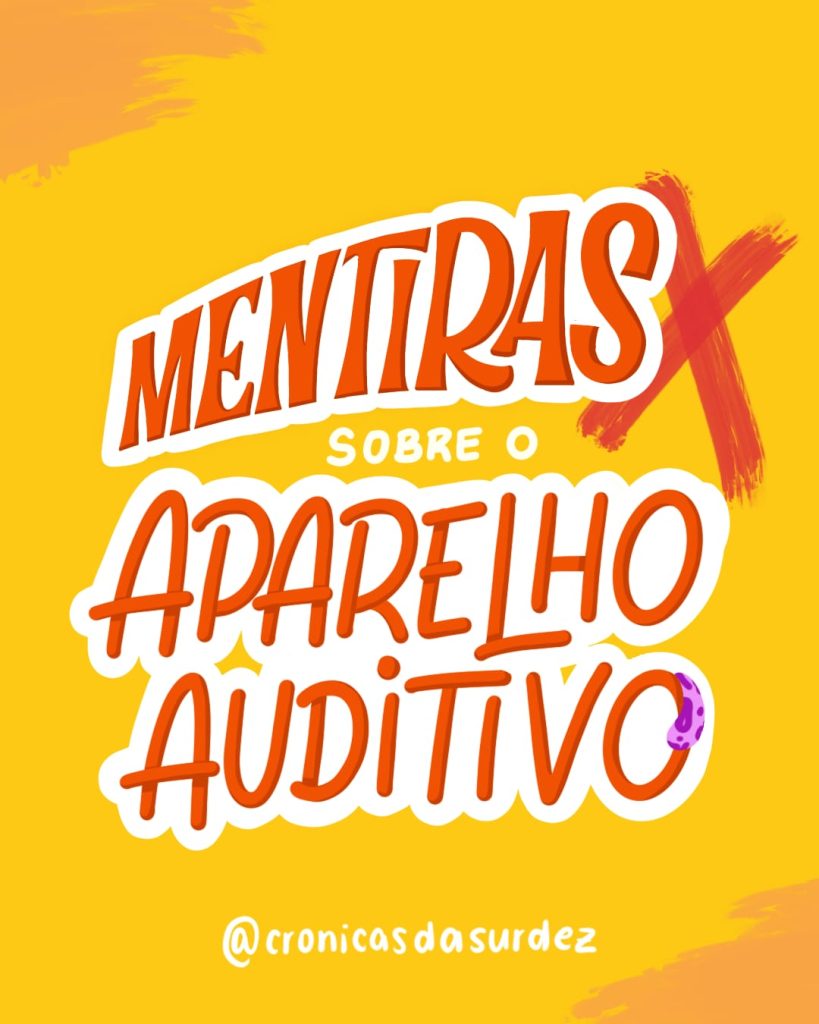Talk to people who use hearing aids from brands such as Phonak, Oticon, Resound, Widex, Signia, Rexton, Argosy, Starkey and Unitron in the
Deaf Who Hear Club
Watch these lessons BEFORE you buy a hearing aid
to learn all the secrets of the hearing industry and not be made a fool of.
If you are new to the world of
HEARING AIDS
know that the most important thing is to
to know the secrets of the hearing industry
. You need to be equipped with quality information on the subject, regardless of whether you’re going to buy them out of your own pocket or whether your hearing aids will be
provided by SUS.
It’s essential to talk to other hearing aid users to clear up all your doubts. The best place to do this is the
Club of the Deaf Who Hear
. If you’re going to buy a new car, the salesperson at the dealership isn’t the right person to help you make the decision, right? That’s right. With hearing aids, the reasoning is the same.
The 10 essential facts about hearing aids
- SUS hearing aids are bad
- Hearing aids cure tinnitus
- Hearing aids restore natural hearing
- It’s better to wait until your deafness gets worse to wear a hearing aid
- Hearing aids are an “old man’s” thing
- Only top-of-the-line and more expensive devices are good
- Not wearing a hearing aid “causes Alzheimer’s”
- Wearing a hearing aid is a source of shame
- There are only very expensive hearing aids
- You spend 10 years in the SUS queue
It’s all a bunch of hooey to scare you into buying an expensive hearing aid. Come and learn everything you need to know about hearing aids.
HOW TO BUY HEARING AIDS?
In order not to make a mistake with your hearing aid purchase, you need to know
the best-kept secrets of the hearing industry
. 95% of the posts on the internet have been written by hearing aid SALES people and hearing aid SHOPS. It’s only at Crônicas da Surdez that you’ll find content written by a deaf woman who hears and who has used hearing aids for many years, as well as knowing all the degrees of deafness: mild, moderate, severe and profound.
I’ve created an even better tool that will save you a lot of money, time and energy in getting back to hearing: a quick 1 hour 30 minute online course that brings together everything I’ve learned in 41 years of living with deafness 24 hours a day.
Tips for NOT making a mistake when buying hearing aids:
To avoid being made a fool of when buying a hearing aid, you need to do a lot of research beforehand. Here are 5 infallible tips you should follow to invest your time, energy and money well:
- Watch the lessons “Don’t make a mistake when buying your hearing aid”
- Become a member of the Deaf Club
- Ask for a referral ENT specialist in deafness at Clube SQO
- Ask for a referral to a trusted speech therapist at Clube SQO
- Test at least 3 hearing aids from 3 different brands
How do I buy a hearing aid?
Here are some important factors you should consider
BEFORE buying a hearing aid
but know that nothing replaces
talking to people who already use hearing aids
e
attending these classes
:
Degree of hearing loss: different hearing aids are designed to suit different levels of hearing loss. It is essential to consult an ENT doctor who specializes in deafness, have an audiometry with a speech therap ist and then test at least 3 brands and models of hearing aids with the guidance of a trusted audiologist.
Lifestyle: consider your daily activities and the environments in which you will use the hearing aid
Budget: hearing aids can vary in price from R$1,500 (from the national hearing aid manufacturer called WaveTech) to R$30,000 each (from the famous foreign brands sold in Brazil).
Technological features: modern hearing aids come with a variety of features, such as Bluetooth connectivity, the ability to adjust volume via an app and noise reduction features.
Brand reputation: research different hearing aid brands and read reviews from other users on the Deaf Club.
How do I know which hearing aid store is reliable?
The only way is to ask hearing aid users for recommendations. And the best place in the world for that is the
CLUB OF THE DEAF WHO HEAR
the only place on the Internet in Brazil with 21,000 hearing-impaired people who use hearing aids and cochlear implants.
Do I need to wear hearing aids?
If you suspect you’re not hearing well, or you turn up the television more than your family members, or if you have the sensation of hearing whistling(ringing) in your ear, it’s time to see a professional! And if your complaint is that you listen but just don’t understand, too!
The first step is to go to an
otolaryngologist
who ear specialistbecause not all of them are up-to-date on the subject of deafness – some are more involved in nose and throat surgeries, for example, and hardly deal with cases of hearing loss, so they may give the patient outdated information.
O otolaryngologist specializing in deafness is essential
Because there are different degrees and types of hearing loss, such as sensorineural, conductive or mixed, and it is important to assess whether the hearing loss is progressive or not, if there is any possible cause, and also to carry out audiometry and imaging tests that only the doctor can order.
Not all deafness is indicated for hearing aids. There are cases where surgery or medication is indicated, only your ENT doctor will be able to recommend the use (or not) of hearing aids.
How to choose your hearing aids
With a doctor’s recommendation, it’s the audiologist because they are the professionals with the knowledge to indicate which hearing aid models are compatible with your hearing loss and ear canal, and to monitor the results and make the necessary adjustments.
When choosing a model, it’s time to think about your hearing results, not your appearance.
It’s a fact: not hearing, or not hearing well, shows up much more than any device!
Everyone notices when someone isn’t listening well, although sometimes the person themselves is the last to know. The devices give us a better quality of life, more time with family and friends, as well as making our work and academic life easier, so shame is just one obstacle to overcome. Don’t get attached to it.
What are the hearing aid models?
There are 3 basic models:
The first is the retro-auricular . Talso known as behind-the-ear (or BTE), which consists of the device and the silicone mold that connects the device to the ear canal and conducts the sound. Each mold is custom-made.
The second type is similar to the first, the receiver on channel, or simply RIC. It also sits behind the user’s ear, but the difference is that the sound is carried to the ear canal by a very thin wire, and then the receiver at the end that emits the sound, where there is a tip or mold.
The third type of device is not behind the ear, but in the ear canal. They can be divided into in-ear (ITE), intra-canal (ITC) or completely in the canal (CIC), and can be custom-made or not, depending on the model and characteristics of each patient.
And the details don’t stop there. There are many factors that influence the hearing result, such as the type of silicone tip or earmold, the ventilation in the in-ear devices, the configuration of the hearing loss, whether it is only in the treble, only in the bass, in all frequencies, and others.
And the only person who can analyze all this information to choose which model(s) are compatible with your hearing loss is your hearing care professional..
If your deafness is compatible with more than one model of hearing aid, ask all your questions about the difference between them and carry out tests before deciding, always thinking about the best hearing quality, comfort and not just appearance.
How do I get a hearing aid?
The two most common ways are purchasing through the Unified Health System (SUS), or buying out of your own pocket. The devices supplied by SUS are the same brands as the stores, up-to-date and of good quality. The only difference is that the public system can’t provide the latest, most expensive release.
If you decide to buy hearing aids, get at least three quotes and test different brands.
Check out the possibilities of financing, such as Banco do Brasil’s accessibility credit or withdrawing FGTS to help with the purchase.
Hearing aids aren’t cheap, and in Brazil we only have the option of combining the service (speech therapy) with the product (hearing aid), not separately. In other words, the purchase price includes monitoring and adjustments with the speech therapist for several years, so the professional’s experience and trust is very important when making the purchase.
Oh, and there’s no such thing as buying a new hearing aid onlinereal hearing aids are registered with ANVISA and the sale only involves choosing the right device for you, as well as monitoring and adjustments whenever necessary.
Just as there are no “universal” glasses without consulting an ophthalmologist to assess the degree of each lens, there are no hearing aids without consulting an audiologist. Cheap device and on the internet? Counterfeit, they have no adjustments, and they can damage your hearing even more.
Read more about Hearing aids:
- How to get hearing aids through SUS
- How to choose the best hearing aid for me
- Beware of hearing aid scams that aren’t hearing aids
- What is the best brand of hearing aid?
- What types of deafness are there?
- What are the degrees of deafness?
Will I hear perfectly with hearing aids?
Perfection and hearing loss don’t go together. You will hear better, yes, but remember that even those with normal hearing don’t hear and understand 100% all the time. So don’t expect perfection.
When you start using hearing aids, the results aren’t instantaneous, and it’s common to feel feeling of hearing everything loudly but not understanding! This is because it’s the beginning of a treatment, your brain still needs to learn or relearn how to listen. It will depend on how long you’ve been without aids, what auditory memories your mind has and how you’re stimulating your ears now.
Imagine a person who lost the movement in their legs years ago. Let’s say that, with treatment, she can walk again: it certainly won’t be on the first day that she goes running, will it? You’ll have to do physiotherapy, stimulate the nerves again, and above all, have patience and effort. Same situation with our ears!
After a while without sound stimuli, with the auditory nerves not picking up sounds, you have to have patience, use the hearing aids and then see the results and then see the results growing every day!
Ashamed of wearing hearing aids
To find out more:
-
- Tips for those starting to use braces
- A guide to hearing aids by people who USE hearing aids
- Price of hearing aids of various brands in 2021
- Things nobody tells you about hearing aids!
- I listen, but I don’t understand!
- Hearing aids and shame, how to deal?
- Why do hearing aids cost so much?
- What about the cochlear implant?
CLUB OF THE HEARING DEAF: join us!

Your deafness journey doesn’t have to be lonely and uninformed! To make it lighter, simpler and full of friends, become a
MEMBER of the Deaf Who Hear Club.
In the Club, you’ll have access to our
digital communities (Facebook, Whatsapp and Telegram groups)
exclusive content, discounts on products and access to our courses*.
There are 21,700 hearing aid and cochlear implant users with the most different types and degrees of deafness for you to talk to and ask questions about the world of hearing loss (rights, hearing aids, doctors, audiologists, implants, exams, etc).
REASONS to join the Deaf Who Hear Club:
- Being in direct contact with those who have been through what you are going through (this makes all the difference!)
- Save thousands of dollars on your hearing aids
- Learn how to get a free hearing aid from SUS
- Don’t fall for scams (the internet is full of tinnitus scammers, fake hearing aids and health professionals who don’t specialize in hearing loss!)
- Talking to thousands of people who have deafness, otosclerosis, syndromes and use hearing aids to hear better
- Meeting hundreds of families of children with hearing loss
- Make friends, get out of isolation and regain your quality of life
- Get directions from
ENT doctors specializing in deafness
and speech therapists in Brazil from people you trust
If you are
parent of a child with hearing loss
one of the Club’s digital communities is a Telegram Group with hundreds of families helping each other every day.
The mistakes you CANNOT make when buying HEARING AID
I’ve been through the saga of buying hearing aids several times. I was once persuaded to go into debt to buy a “discreet and invisible” hearing aid that didn’t even cover my deafness. I’ve already been scammed when I took a hearing aid for repair to the store where I bought it: the audiologist said it was no longer suitable for me without even checking it or doing a new
audiometry
. I almost fell for the vicar’s tale of spending a fortune on a “top of the range” hearing aid for profound deafness, the features of which I would never be able to take advantage of due to the severity of my deafness. I’ve already been pressured into buying a hearing aid because the “unmissable promotion” was supposed to last until the next day. I also almost made the mistake of buying a hearing aid that was almost out of stock because of a stratospheric discount that ‘ended tomorrow’.
But YOU don’t have to go through that.
I’ve created a quick 1 hour 30 minute online course that brings together everything I’ve learned about buying hearing aids in 42 years of living with deafness 24 hours a day and that will save you a lot of money, time and energy getting your hearing back. In it, you’ll learn about the hearing industry’s WORST PRACTICES and everything you need to know and ask the healthcare professional testing your hearing aid. Become a student HERE.
DEAF COURSES


